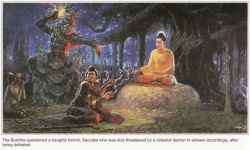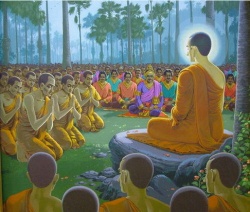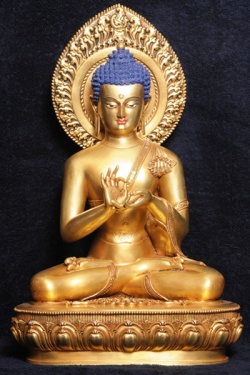Right View
Then Anathapindika the Householder went to where the wanderers of other persuasions were staying. On arrival he greeted them courteously. After an exchange of friendly Greetings and courtesies, he sat to one side. As he was sitting there, the wanderers said to him, 'Tell us, Householder, what views Gotama the contemplative has.'
'Venerable sirs, I don't know entirely what views the Blessed One has.'
'Well, well. So you don't know entirely what views Gotama the contemplative has. Then tell us what views the monks have.'
'I don't even know entirely what views the monks have.'
'So you don't know entirely what views Gotama the contemplative has or even that the monks have. Then tell us what views you have.'
'It wouldn't be difficult for me to expound to you what views I have. But please let the Venerable ones expound each in line with his position, and then it won't be difficult for me to expound to you what views I have.'
When this had been said, one of the wanderers said to Anathapindika the Householder, 'The cosmos is eternal. Only this is true; anything otherwise is worthless. This is the sort of view I have.'
Another wanderer said to Anathapindika, 'The cosmos is not eternal. Only this is true; anything otherwise is worthless. This is the sort of view I have.'
Another wanderer said, 'The cosmos is finite...'...'The cosmos is infinite...'...'The soul and the Body are the same...'...'The soul is one thing and the Body another...'...'After Death a Tathagata exists...'...'After Death a Tathagata does not exist...'...'After Death a Tathagata both does and does not exist...'...'After Death a Tathagata neither does nor does not exist. Only this is true; anything otherwise is worthless. This is the sort of view I have.'
When this had been said, Anathapindika the Householder said to the wanderers, 'As for the Venerable one who says, "The cosmos is eternal. Only this is true; anything otherwise is worthless. This is the sort of view I have," his view arises from his own inappropriate attention or in dependence on the words of another. Now this view has been brought into being, is fabricated, willed, dependently originated. Whatever has been brought into being, is fabricated, willed, dependently originated, that is inconstant. Whatever is inconstant is stress. This Venerable one thus adheres to that very stress, submits himself to that very stress.' (Similarly for the other positions.)
When this had been said, the wanderers said to Anathapindika the Householder, 'We have each and every one expounded to you in line with our own positions. Now tell us what views you have.'
'Whatever has been brought into being, is fabricated, willed, dependently originated, that is inconstant. Whatever is inconstant is stress. Whatever is stress is not me, is not what I am, is not my self. This is the sort of view I have.'
'So, Householder, whatever has been brought into being, is fabricated, willed, dependently originated, that is inconstant. Whatever is inconstant is stress. You thus adhere to that very stress, submit yourself to that very stress.'
'Venerable sirs, whatever has been brought into being, is fabricated, willed, dependently originated, that is inconstant. Whatever is inconstant is stress. Whatever is stress is not me, is not what I am, is not my self. Having seen this well with right discernment as it actually is present, I also discern the higher escape from it as it actually is present.'
When this had been said, the wanderers fell silent, abashed, sitting with their shoulders drooping, their heads down, brooding, at a loss for words. Anathapindika the Householder, perceiving that the wanderers were silent, abashed... at a loss for words, got up and left.
— A X.93
There is the case where an uninstructed, run-of-the-mill person... does not discern what ideas are fit for attention, or what ideas are unfit for attention. This being so, he does not attend to ideas fit for attention, and attends instead to ideas unfit for attention... This is how he attends inappropriately: 'Was I in the past? Was I not in the past? What was I in the past? How was I in the past? Having been what, what was I in the past? Shall I be in the future? Shall I not be in the future? What shall I be in the future? How shall I be in the future? Having been what, what shall I be in the future?' Or else he is inwardly perplexed about the immediate present: 'Am I? Am I not? What am I? How am I? Where has this being come from? Where is it bound?'
As this person attends inappropriately in this way, one of six kinds of view arises in him: The view I have a self arises in him as true and established, or the view I have no self... or the view It is by means of self that I perceive self... or the view It is by means of self that I perceive not-self... or the view It is by means of not-self that I perceive self arises in him as true and established, or else he has a view like this: This very self of mine — the knower that is sensitive here and there to the ripening of Good and bad actions — is the self of mine that is Constant, everlasting, eternal, not subject to change, and will endure as long as eternity. This is called a thicket of views, a wilderness of views, a contortion of views, a writhing of views, a Fetter of views. Bound by a Fetter of views, the uninstructed run-of-the-mill person is not freed from birth, aging, and Death, from sorrow, lamentation, pain, distress, and despair. He is not freed from stress, I say.
The well-taught Noble Disciple... discerns what ideas are fit for attention, and what ideas are unfit for attention. This being so, he does not attend to ideas unfit for attention, and attends instead to ideas fit for attention... He attends appropriately, This is stress... This is the origin of stress... This is the cessation of stress... This is the way leading to the cessation of stress. As he attends appropriately in this way, three Fetters are abandoned in him: identity-view, Doubt, and grasping at precepts and practices.
— M 2
Kaccayana: 'Lord, "Right view, right view," it is said. To what extent is there right view?'
The Buddha: 'By and large, Kaccayana, this cosmos is supported by (takes as its object) a polarity, that of existence and non-existence. But when one sees the origination of the cosmos as it actually is with right discernment, "non-existence" with reference to the cosmos does not occur to one. When one sees the cessation of the cosmos as it actually is with right discernment, "existence" with reference to the cosmos does not occur to one.
'By and large, Kaccayana, this cosmos is in bondage to attachments, clingings (sustenances), and biases. But one such as this does not get involved with or cling to these attachments, clingings, fixations of awareness, biases, and latent tendencies; nor is he resolved on "my self." He has no uncertainty or Doubt that, when there is arising, only stress is arising; and that when there is passing away, stress is passing away. In this, one's Knowledge is independent of others. It is to this extent, Kaccayana, that there is right view.'


